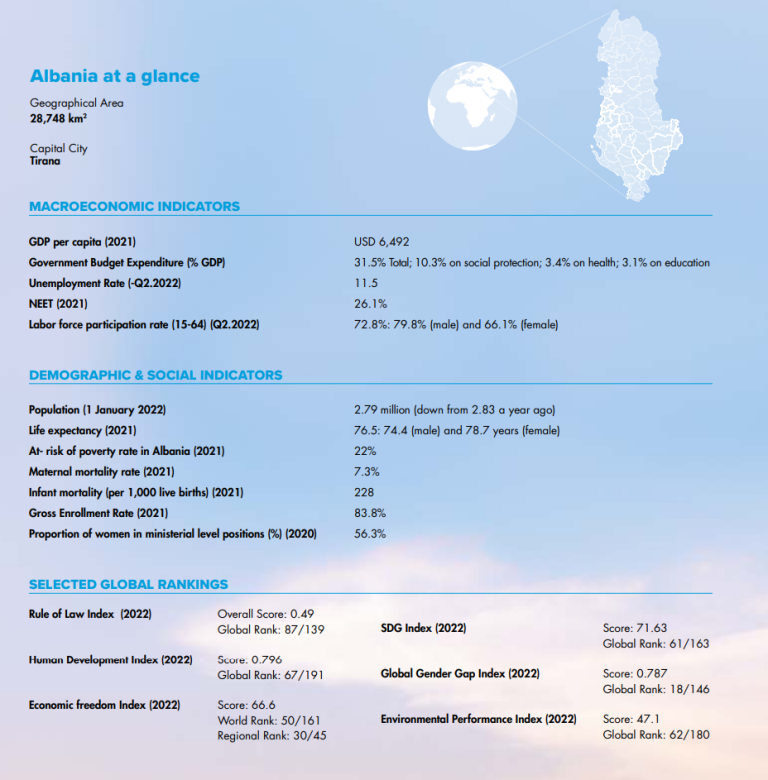Key Developments in 2022
Key Developments
Despite the challenges posed by the triple shock of the earthquake of November 2019, the Covid-19 pandemic since 2020, and the start of the war in Ukraine in 2022, Albania has continued to show its commitment to European Union (EU)-oriented reforms and delivered tangible and sustainable results. The first Inter-governmental Conference in July 2022 marked the opening of accession negotiations with the EU. Albania is the only country in the region that has signed cooperation agreements with all justice and home affairs agencies of the EU. The third National Strategy for Development and European Integration (NSDEI) 2022–2030 has been prepared in consultations with all stakeholders, including the UN, and has the potential to strengthen the interface between the socio-economic and environmental targets and the overall governance reforms. Also, it will play an important role in implementation of the Government of Albania and United Nations Sustainable Development Cooperation Framework (UNSDCF) 2022–2026. The government is well positioned to address the many challenges facing Albania and has included agriculture, energy, digitalization, tourism and fighting corruption among its priorities, with European integration as the guiding goal.
In terms of sustainable development, Albania’s real economic growth rebounded better than foreseen following the pandemic, and is projected to be around 3.2 percent for 2022. The country experienced a smooth vaccination rollout, with no further lockdowns and continued recovery in services, led by tourism, and construction. Good progress was made to refocus health services at the primary level, introduce digital health services and improve transparency and accountability. The 2022 Sustainable Development Report index score of 71.63 suggests that the country is more than two-thirds of the way towards achieving the SDGs, with a position of 61 out of 163 countries. The second Gender Equality Index was conducted in 2022 to measure gender inequalities across reproductive health, empowerment, and participation in the labour market.It shows that gender disparities have increased in the past year, with an increased value of 0.09 compared to 0.06 measured in 2021 (Men and Women in Albania, INSTAT 2022)

Albania is party to the nine core international human rights treaties. The Rome Statute of the International Criminal Court and the main Council of Europe human rights instruments have been ratified. Meanwhile, Albania is a transit country for economic migrants, refugees and asylum seekers, and is hosting Afghan and Ukrainian refugees. 2022 marked the first year of Albania’s non-permanent membership to the United Nations Security Council. The Women, Peace and Security Agenda is amongst the key priorities for the government, as well as promoting human rights, countering violent extremism, and tackle climate change and security.
Strengthening regional cooperation rests at the centre of Albania’s foreign policy and leads the country’s constructive approach and active leadership in the region. Albania has maintained its engagement in a number of regional cooperation initiatives: examples include the Berlin Process, Regional Youth Cooperation Office, the Central European Free Trade Agreement (CEFTA), the Regional Cooperation Council, the Multi-annual Action Plan for a Regional Economic Area in the Western Balkans, Energy Community, Transport Community, the South East European Cooperation Process (SEECP) and the Regional Cooperation Council. The country hosts the secretariats of the Regional Youth Cooperation Office (RYCO) and the Western Balkans Fund (WBF) and in December 2022 it hosted the EU–Western Balkans summit in the capital city, Tirane. A sub-regional cooperation mechanism established with Serbia and North Macedonia known as ‘Mini-Schengen’, or Open Balkans Initiative, was declared in 2019 with the main purpose of intensifying intra-regional cooperation and integration in the Western Balkans. Making further progress at a summit in Ohrid in June 2022, leaders from participating countries signed several agreements such as on mutual recognition of diplomas, tax evasion, and cross-border cooperation in culture and tourism.

